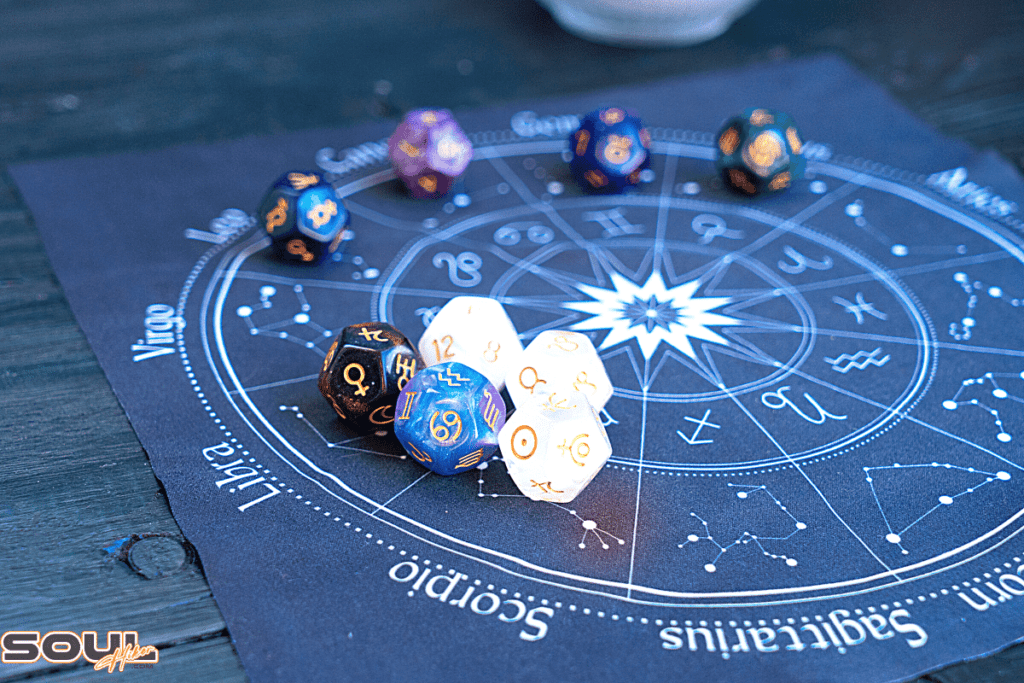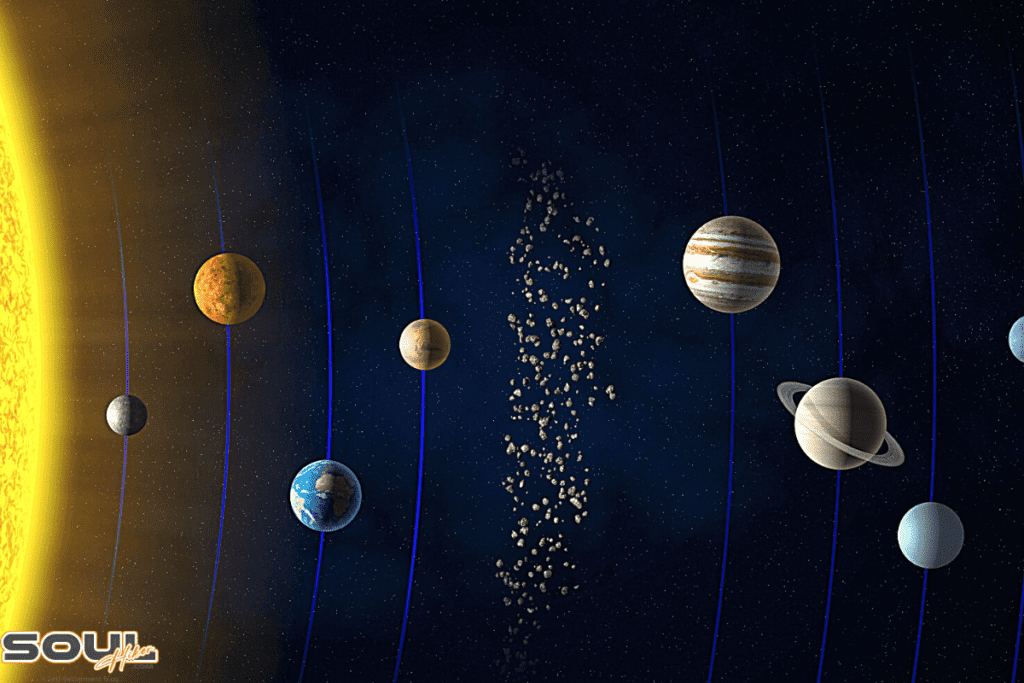Welcome to the cosmic dance floor, where the stars are more than just twinkling lights in the night sky – they’re the ancient DJs of destiny. Astrology, often mistaken as the horoscope section of the daily newspaper, is actually an age-old practice that intertwines our lives with the movements of celestial bodies. Think of it as the original GPS, guiding humans through the journey of life long before smartphones took over. This introduction marks the beginning of our Astrology for Beginners guide, where we’ll delve into the captivating world of cosmic influence and self-discovery
Table of Contents
- 1 What is Astrology?
- 2 The Foundations of Astrology
- 3 Planetary Peeps: The Celestial Influencers
- 4 Houses in Astrology
- 5 Understanding Your Birth Chart
- 6 The Elements and Modalities
- 7 Cosmic Connections: Understanding Aspects
- 8 Astrology in Everyday Life
- 9 Common Misconceptions and Criticisms
- 10 Learning and Practicing Astrology
- 11 A Soul Hiker Tip On Cosmic Influence
What is Astrology?
Astrology is like the universe’s own social media, where planets and stars post updates about your life. It’s an ancient language, spoken by celestial bodies, telling a story of how cosmic forces influence earthly events and human affairs. But don’t confuse astrology with its distant cousin astronomy – while astronomy is busy measuring star distances, astrology is reading their vibes.
The Cosmic Time Machine: A Brief History
The story of astrology is as old as civilization itself, a time-honored tradition that spans cultures and continents. It’s like a celestial time machine, taking us on a journey from the Babylonians – who first mapped the stars for agricultural reasons – to the Greeks, who brought in the zodiac signs, and right up to modern-day meme culture, where Mercury Retrograde is the ultimate scapegoat for life’s little mishaps.
The Foundations of Astrology
Most people know their Sun sign – saying “I’m a Gemini!” at parties as if it’s a universal icebreaker. But the zodiac is more like a cosmic soup with twelve different ingredients, each adding its own flavor. These signs are the basic building blocks of astrology, each one representing a segment of the sky and a slice of your personality pie.
The Zodiac Squad: A Roll Call
- Aries: The go-getters, charging headfirst like the Ram that symbolizes them.
- Taurus: The sensualists, loving stability like a bull loves its pasture.
- Gemini: The communicators, social butterflies that they are, fluttering from one conversation to another.
- Cancer: The nurturers, as protective and caring as a mother crab with her brood.
- Leo: The show-offs, basking in the spotlight like the sun-ruled lions they are.
- Virgo: The perfectionist, analyzing everything with a fine-tooth comb.
- Libra: The diplomats, weighing every decision like the scales that represent them.
- Scorpio: The mystery solvers, diving deep into life’s secrets like a probing scorpion.
- Sagittarius: The adventurers, galloping towards new experiences like the centaurs they’re symbolized by.
- Capricorn: The CEOs, climbing every mountain of success with the determination of a goat.
- Aquarius: The visionaries, thinking outside the box like the water-bearer bringing fresh ideas.
- Pisces: The dreamers, swimming in deep emotional waters like the fish they are
Planetary Peeps: The Celestial Influencers
Think of the planets as the influencers of cosmic social media, each with its own brand and style. Just like how influencers affect trends, planets influence different aspects of our lives.
Like the CEO of a company, the Sun holds significant sway in your astrological profile, dictating your core essence, your ego, and your life purpose. The Moon is like your emotional barometer, governing your inner moods, feelings, and maternal connections.
The cosmic messenger Mercury, is a planet that is all about communication – whether you’re a smooth talker or tend to put your foot in your mouth. Think of Venus as the love guru, ruling over your romantic inclinations and how you splurge on those little luxuries in life.
Mars is the action hero of the planetary lineup, governing drive, energy, and how you assert yourself. Jupiter is the Santa Claus of the solar system, bringing joy, luck, and an extra serving of optimism.
Like a strict teacher, Saturn is all about discipline, responsibility, and learning life’s tough lessons. The quirky one in the group, Uranus is known for bringing sudden changes and revolutionary ideas.
Neptune is a planet that is like a mystical fog, overseeing dreams, intuition, and all things spiritual. Lastly, although small, Pluto is mighty, dealing with transformation and the deeper, darker undercurrents of life.
Houses in Astrology
In astrology, houses represent different areas of life, like rooms in a cosmic house, each with its own purpose and decor.
- 1st House (The Self): The entryway, representing your personality and outward style.
- 2nd House (Values and Possessions): The safe, where you store your values and material goodies.
- 3rd House (Communication): The living room, a space for communication and sharing ideas.
- 4th House (Home and Family): The family room, dictates your home life and family dynamics.
- 5th House (Pleasure and Creativity): The game room, overseeing joy, creativity, and romance.
- 6th House (Health and Service): The home gym, focuses on health, routine, and service to others.
- 7th House (Partnerships): The master bedroom, governs marriage and business partnerships.
- 8th House (Transformation): The basement, dealing with transformation, sexuality, and shared resources.
- 9th House (Philosophy and Travel): The home office, where you explore higher learning and long journeys.
- 10th House (Career and Reputation): The trophy room, shaping your career and public persona.
- 11th House (Community and Friends): The patio, is focused on friendships and group activities.
- 12th House (Subconscious and Secrets): The hidden closet, dealing with the subconscious and hidden aspects of life.
Understanding Your Birth Chart

Your birth chart is like a cosmic snapshot of the sky at the moment you took your first breath. It’s a personal treasure map, with the stars and planets playing a game of celestial hide and seek, revealing your strengths, challenges, and potential.
Decoding the Celestial Map
- Creating Your Birth Chart: Just as you need your address to find your home, you need your birth time, date, and place to create your birth chart.
- The Sun, Moon, and Rising Signs: These are your astrological big three – like the heart, mind, and soul of your chart. The Sun sign shows your core, the Moon sign reveals your emotional side, and the Rising sign is how you appear to the world.
- Planetary Positions: Understanding where each planet was when you were born gives insights into different facets of your life.
The Elements and Modalities
Just like a great recipe needs the right balance of ingredients, the zodiac signs are mixed into four elemental groups: Fire, Earth, Air, and Water. Each element imparts unique characteristics to its signs.
- Fire Signs (Aries, Leo, Sagittarius): They’re the sparklers of the zodiac. Full of energy, enthusiasm, and a touch of drama, fire signs are often the life of the party. They’re driven by a desire to express themselves and ignite the world around them.
- Earth Signs (Taurus, Virgo, Capricorn): Imagine a steady, nurturing garden. Earth signs are all about stability, practicality, and grounding. They’re the ones who keep it real, bringing a sense of solidity and reliability wherever they go.
- Air Signs (Gemini, Libra, Aquarius): Like a refreshing breeze, air signs bring a gust of fresh ideas, intellectual stimulation, and social interaction. They’re the communicators of the zodiac, always seeking to connect, share, and explore.
- Water Signs (Cancer, Scorpio, Pisces): Water signs are the emotional oceans of the zodiac. Deep, intuitive, and sensitive, they’re driven by their feelings and can often sense the undercurrents of any situation.
Modalities: The Rhythms of the Zodiac
In astrology, modalities refer to the three different rhythms in which the zodiac signs operate: Cardinal, Fixed, and Mutable. Each modality has its way of expressing and handling life’s challenges.
- Cardinal Signs (Aries, Cancer, Libra, Capricorn): These are the initiators. Cardinal signs are all about new beginnings and taking charge. They’re the trendsetters and leaders, always ready to start something new.
- Fixed Signs (Taurus, Leo, Scorpio, Aquarius): The stabilizers of the zodiac. Fixed signs are about perseverance and maintaining what’s already been established. They’re the ones who dig in their heels and see things through to the end.
- Mutable Signs (Gemini, Virgo, Sagittarius, Pisces): The adapters of the zodiac. Mutable signs are flexible and versatile, able to adjust and change according to the situation. They’re the ones who can roll with the punches and thrive on change.
Understanding the elements and modalities can add depth to your astrological exploration, offering insights into the diverse personalities and behaviors of the zodiac signs.
Cosmic Connections: Understanding Aspects

In astrology, aspects represent the angles formed by planets on the celestial sphere, akin to celestial conversations with distinct tones and topics. Conjunctions occur when planets align closely, merging their energies like old friends, and intensifying their influence.
Squares, on the other hand, symbolize challenging aspects, reminiscent of heated debates that create tension yet offer potential for growth. Trines are harmonious aspects, where planets provide support, offering a smooth and encouraging pep talk.
Oppositions manifest when planets stand directly across from each other, resembling a tug-of-war, fostering an energy of balance and heightened awareness. Understanding these aspects provides profound insights into the dynamics of your birth chart and ongoing astrological influences.
In addition to aspects, astrology encompasses transits, signifying planetary movements and their interactions with the positions of planets at your birth. It’s akin to the universe updating its status and its impact on your daily life.
Observing transits aids in comprehending the timing of specific life events and phases, such as Mercury Retrograde, often associated with reflection and revisiting past issues, despite its reputation for causing disruptions.
Astrology in Everyday Life
Astrology can be a helpful tool for navigating life’s decisions, big and small. By understanding the astrological influences at play, you can choose the best times to act, reflect, or make changes.
Some of the most popular and sought-after advice involves career guidance and relationships. Astrology can offer insights into your strengths and challenges, helping you find a career path aligned with your astrological makeup. Compatibility analysis can provide a deeper understanding of the dynamics between you and your partner or potential partners.
Using astrology as a guide can help you make sense of life’s ups and downs. It offers a unique perspective, helping you to see challenges as opportunities for growth and aligning your actions with the cosmic flow.
- Personal development: Astrology can be a tool for self-discovery, revealing hidden traits and potentials.
- Decision-making: Understanding the astrological influences can help you make informed decisions at the right time.
Common Misconceptions and Criticisms
Astrology often faces skepticism and criticism, mostly due to common misconceptions and a lack of understanding. It is not about predicting the future with certainty but about understanding tendencies and potentials. It’s also not just about sun signs. A full astrological analysis considers many factors, including the moon sign, rising sign, planets, houses, and aspects.
While astrology is not a science in the traditional sense, it offers a symbolic language that many find valuable and insightful. The scientific community generally does not recognize astrology as a scientific discipline. However, many people find personal value in astrology, using it as a tool for introspection and understanding human behavior.
Learning and Practicing Astrology
Starting your journey into astrology can be both exciting and overwhelming. There are many paths to explore, each offering a unique perspective on the cosmos and how it relates to our lives.
Start by familiarizing yourself with the zodiac signs, planets, houses, and aspects. Understanding these core elements is crucial for interpreting astrological charts.
A great way to learn astrology is by starting with your birth chart. It’s like a personal case study, allowing you to connect the theoretical knowledge with your experiences.
Resources for Aspiring Astrologers
There are numerous resources available for those interested in learning more about astrology. From books to online courses, here’s how you can deepen your astrological knowledge:
- Books: Many beginner-friendly astrology books offer a comprehensive overview of the subject.
- Online Courses: Various platforms offer courses in astrology, ranging from beginner to advanced levels.
- Astrology Apps: Many apps provide daily horoscopes, birth chart interpretations, and learning tools.
A Soul Hiker Tip On Cosmic Influence
Astrology offers a unique lens through which we can view ourselves and the world around us. It’s a blend of ancient wisdom and personal insight, providing guidance and a deeper understanding of our lives. Whether you use astrology for self-reflection, making informed decisions, or simply as a fun way to connect with the cosmos, its value lies in the personal meaning it brings. Here at Soul Hiker, we encourage you to remember that astrology is not a rigid doctrine but a fluid, interpretive art. It invites you to explore and form your own connections with the universe.

